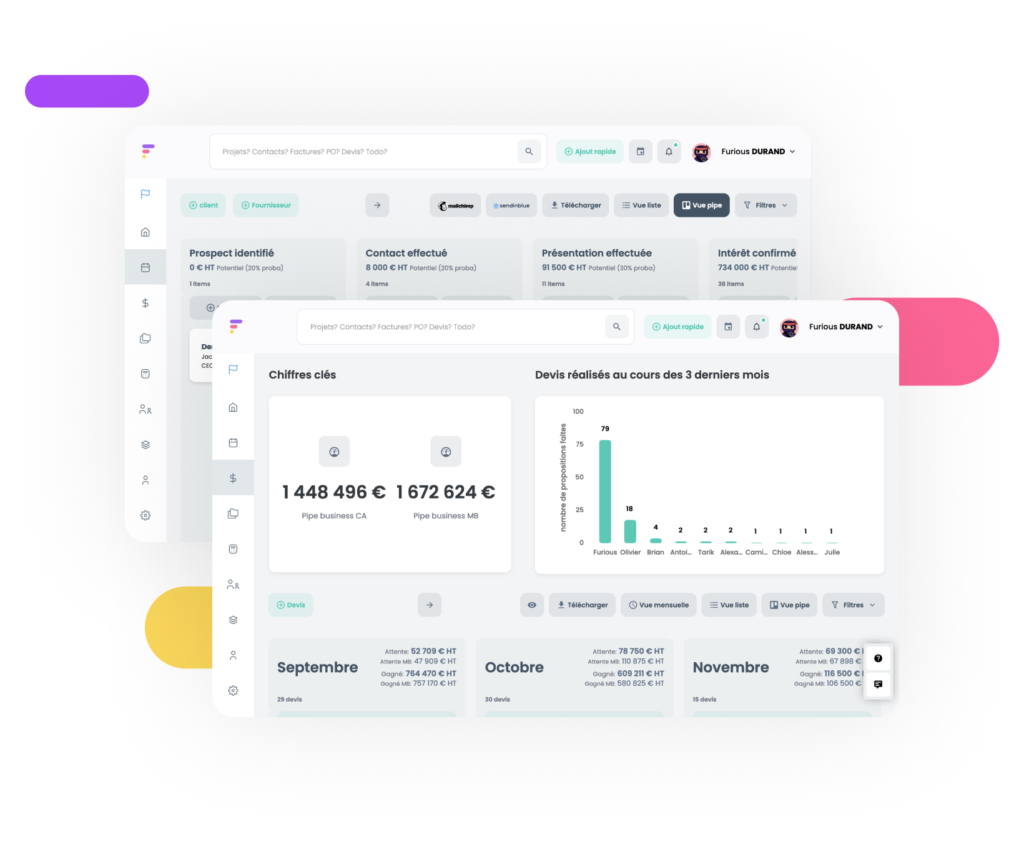What is the benefit of connecting your CRM with your billing tool? Have you ever thought it would be possible (and essential!) to link CRM and project management? Why not turn your marketing strategy into a powerful machine by integrating your CRM with other essential software for your business?
The relationship between your tool and your billing or project management system may seem trivial, but integrations made through APIs can propel your sales and productivity to unexpected heights.
Imagine a world where every contact and prospect is tracked in real-time on the web, where every marketing campaign is directly linked to your sales, and where data is optimally utilized. When your users work smoothly with well-integrated applications, you are assured of better contact management and enhanced collaboration.
This vision led us to explore the multiple benefits of effective integration. And believe us, the journey revealed amplified productivity and strengthened customer relationships. Join us in this exploration for ultra-efficient business management focused on strategy, sales, and, of course, consistent profitability.
The importance of CRM tools in business
In an increasingly competitive business environment, customer relationship management (CRM) tools play a crucial role in maintaining and improving relationships with customers.
They not only allow efficient management of interactions but also improve overall firm performance through data analysis.
A CRM can help automate sales tracking, leading to improved efficiency and productivity.
Systematic tracking of customer interactions can provide valuable insights into their behaviors, preferences, and needs, helping to guide marketing and sales strategies.

Integrating CRM with other business management systems
The benefits of integrating a CRM tool with other business management systems are numerous.
- Integration with a billing software: this can help simplify billing processes, reduce errors, and improve payment tracking.
- Integration with a project management system: this can help better coordinate team efforts and improve project delivery.
- These integrations can also facilitate information sharing between different departments of the company, helping to improve decision-making and overall efficiency.
Integrating CRM and billing systems
Billing systems are essential for any business.
They allow tracking sales, managing invoices, and monitoring payments.
Integrating a CRM tool with a billing system can help simplify these processes by allowing smooth data transfer between the two systems.
For example, when a sale is recorded in the CRM, the information can be automatically transferred to the billing system to generate an invoice.
This can help reduce manual entry errors, speed up the billing process, and improve customer satisfaction.
Integrating CRM and project management systems
Similarly, integrating a CRM tool with a project management system can help improve team coordination and efficiency.
Customer and project information can be shared between the two systems, ensuring that all team members have access to the most recent and accurate information.
This can also help avoid duplicate work and ensure that all team members are on the same page regarding project expectations and goals.
Benefits of such integration
Integrating a CRM tool with other business management systems offers many advantages.
- Firstly, it can help improve operational efficiency by automating manual processes and reducing errors.
- Secondly, it can help improve decision-making by providing a more complete and accurate view of company data.
- Finally, it can help improve customer satisfaction by enabling better management of customer interactions.
To understand how business management software can improve your commercial efficiency, feel free to check out our brief dedicated to this topic.

Automation and efficiency improvement
Integrating a CRM with other business management systems can help automate many manual processes, reducing errors and improving efficiency.
For example, integration with a billing system can help automate the billing process, reducing errors and speeding up the process. You no longer have to worry about invoices and reminders – they are sent directly when the project is closed, or the deadline is met.
Similarly, integration with a project management system can help improve team coordination, ensuring all collaborators have access to the most recent and accurate information. In case of payment issues or no response from the client, projects do not continue, and the time allocated to them is then saved for other tasks.
Improved decision-making
For example, by integrating CRM with the project management system, notably via a CRM pipe, managers can gain a more accurate view of the status of projects and available resources. This enables better anticipation of tasks, while helping to make more informed decisions on resource allocation and project management, particularly in the production department.
Similarly, integrating CRM with the invoicing system can help to improve payment tracking and make more informed decisions on invoicing and collection strategies. You can also choose whether or not, as with Furious, to integrate disputed invoices into your sales visualization, or hide them for a projective view without the wait and stress of collection processes.
Enhanced customer satisfaction
Finally, integrating a CRM tool with other business management systems can help improve customer satisfaction.
By having a complete view of customer interactions, companies can offer more personalized and responsive service.
Additionally, by automating processes such as billing, firms can ensure fast and accurate service, which can help improve customer satisfaction.
Standing out with customized CRM integration: our unique approach
In a rapidly evolving technological world, it is essential to stand out with a unique approach. At Furious, we believe that every business is unique and deserves a tailored CRM solution. Instead of adopting a “one-size-fits-all” approach, we focus on your specific needs to design a CRM integration strategy that suits you.
- User-centered approach: we place your needs and those of your clients at the heart of our concerns. This means we strive to deeply understand your company, your goals, and your challenges.
- Scalable solutions: your business evolves, and so should your CRM. We offer integration solutions that can adapt and evolve with you.
- Customized integrations: we understand that every business has its own tools and processes. We ensure that your CRM integrates perfectly with your existing tools, ensuring a smooth transition.
- Continuous support: our relationship with you does not end once the integration is done. We are here to support you at every stage, ensuring you get the most out of your CRM.
The art of connecting and automating: the kjey to a powerful CRM
You might wonder why automation is so crucial in the CRM world? It’s simple: it saves you time, optimizes your resources, and improves the customer experience.
- Time savings: by automating repetitive tasks, you free up precious time that you can devote to higher-value activities.
- Improved customer experience: through automation, you can offer quick and relevant responses to your customers, increasing their satisfaction.
- Increased reliability: with automated processes, you reduce the risk of human error, ensuring smooth and reliable operations.
- Data analysis: a powerful software gives you access to valuable data. By automating the analysis, you can obtain information quickly, allowing you to adjust your strategies accordingly.
To summarize, at Furious, we believe that the combination of customized CRM integration and strong automation is the key to success. We are here to help you achieve this vision and propel your organization to new heights.
Choosing a commercial CRM
Choosing a commercial CRM suited to your needs is crucial to maximizing the benefits of this integration.
It is important to choose a CRM that offers the functionalities you need and can easily integrate with your other business management systems.
The Furious vision
At Furious, we advocate for the importance of globalized business management with an all-in-one software tailored to business needs.
This is why we have designed our business management software to be custom-made, integrating all essential business management categories: CRM, billing, HR, and project management are managed simply and synchronously across the entire operational deployment, as well as analysis and decision-making (thanks to our dashboards, real-time updated data, and predictive systems).
But Furious also integrates easily with a variety of other systems, including CRM tools, more specific business software, accounting software, and more… This, thanks to our powerful API.
Why is CRM data preparation essential for successful integration?
In the complex world of these tools, data preparation is not a luxury; it is a necessity. Indeed, for your CRM to be a real asset for your structure, the data it contains must be accurate, relevant, and well-structured. Here is why this step is fundamental:
- Data quality: poorly prepared data can lead to errors, distort your analyses, and result in suboptimal decisions. Thorough cleaning and organization of your data ensure its reliability.
- Performance optimization: properly preparing your data ensures smooth use of your CRM, avoiding slowdowns and technical problems.
- Improved user experience: well-structured and coherent data makes navigation and search easier, making your CRM more intuitive for your teams.
- Better analysis: properly prepared data allows for more accurate analyses, giving you a clear view of your operations and opportunities.
- Ease of integration with other systems: standardized and well-organized data can be more easily integrated with other tools, creating a harmonious business ecosystem.
Thus, CRM data preparation is the cornerstone of successful integration, ensuring efficiency, accuracy, and optimal use of your system.
The role of a CRM integrator: beyond simple implementation
When thinking of a CRM integrator, one might imagine someone who merely installs software. However, the role of a CRM integrator goes far beyond that. Discover what makes this profession unique:
- Understanding business needs: first and foremost, the integrator must understand the company's vision, objectives, and specific challenges to propose a customized solution.
- Advising on best practices: leveraging their expertise, the integrator guides the company on the best CRM strategies to adopt to maximize returns.
- Team training: once the CRM is in place, it is essential to properly train the teams to use it effectively. This is where the integrator steps in, ensuring a smooth onboarding of the new tool.
- Ongoing support: CRM integration is not a one-time project. The integrator provides continuous support, helping the entity evolve and adapt its CRM as its needs change.
- Data security: the integrator ensures the implementation of robust protocols to guarantee data security, a crucial issue in the digital age.
Thus, the CRM integrator is much more than a mere technician. They are a strategic partner who supports you at every step, ensuring that the CRM becomes a true growth lever.
If you want to learn more about the importance of driving your business with forecasts, feel free to check out our page 3 Reasons to Drive Your Business with Forecasts.
If you are convinced and ready to finely tune your business, now is the time to discover Furious! The demo is free, and you get a 15-day trial of the solution.